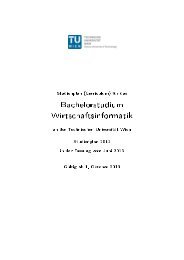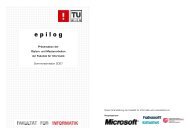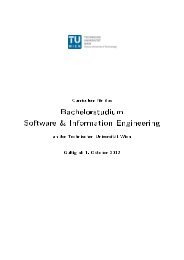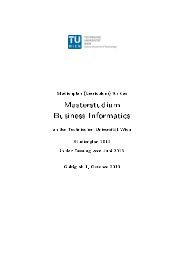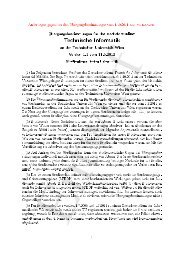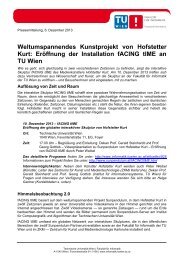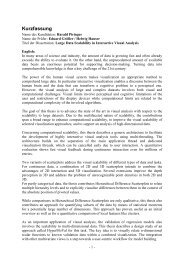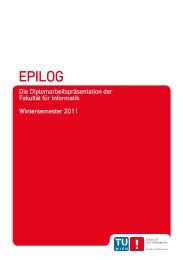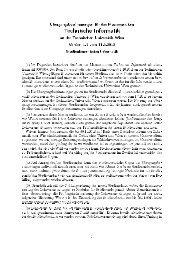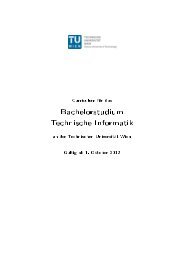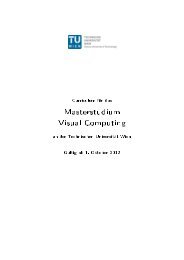Abstract-Band - Fakultät für Informatik, TU Wien - Technische ...
Abstract-Band - Fakultät für Informatik, TU Wien - Technische ...
Abstract-Band - Fakultät für Informatik, TU Wien - Technische ...
Sie wollen auch ein ePaper? Erhöhen Sie die Reichweite Ihrer Titel.
YUMPU macht aus Druck-PDFs automatisch weboptimierte ePaper, die Google liebt.
Institut <strong>für</strong> <strong>Technische</strong> <strong>Informatik</strong><br />
Arbeitsbereich Embedded Computing Systems<br />
Andreas Hagmann<br />
Performance Aware Hardware Runtime Monitors<br />
Studium: Masterstudium <strong>Technische</strong> <strong>Informatik</strong><br />
BetreuerIn: Ao.Univ.Prof. Dr. Andreas Steininger<br />
The field of research for runtime verification (RV) deals with verification<br />
methods, classified between common testing and formal verification. In a RV<br />
setting, the system under test (SUT) is observed by a runtime monitor that<br />
checks the monitored behaviour against a specification. Based on existing<br />
approaches, this thesis presents a RV framework, capable of observing embedded<br />
real-time systems. The proposed framework features a runtime monitoring<br />
unit, implemented as micro-processor architecture. The monitoring unit<br />
is built entirely in hardware and may be used stand-alone or integrated in the<br />
target system. It evaluates claims, specified as atomic propositions, Linear<br />
Temporal Logic, and Metric Temporal Logic formulas. The connection to the<br />
system under test is established by wire-taping its external interfaces. After an<br />
introduction to RV methods, this thesis captures the state-of-the-art and<br />
provides theoretical background. It proceeds with an analysis of existing parts<br />
and proposes optimizations on them. Thereby, the influence of different<br />
improvements is compared and verified by benchmarks, conducted with a<br />
software model of the runtime verification unit. Furthermore, the runtime verification<br />
framework is extended to support natively the evaluation of future<br />
time temporal formulas. A prototype implementation, shows the feasibility of<br />
the novel approach. The design of the RV unit is done with special focus on<br />
not influencing the behaviour of the SUT and getting along with the limited<br />
resources available within embedded systems. Benchmark results compare the<br />
improved runtime verification unit to the existing design and show a speed up<br />
factor of twelve. Synthesis runs show, that the proposed design fits well into a<br />
low-end commercial off-the-shelf FPGA. A case study completes this thesis and<br />
demonstrates the benefit of a RV unit within a real-world Unmanned Aerial<br />
System to detect erroneous sensor readings.<br />
6<br />
Markus Hofstätter<br />
Solving the Labeling Problem: A Byzantine Fault-Tolerant Self-Stabilizing FPGA<br />
Protoptye based on the FATAL+ Protocol<br />
Studium: Masterstudium <strong>Technische</strong> <strong>Informatik</strong><br />
BetreuerIn: Univ.Prof. Dr. Ulrich Schmid<br />
The topic of this thesis lies in the intersection of VLSI design and fault-tolerant<br />
distributed algorithms. It is devoted to the development of an FPGA implemen-



